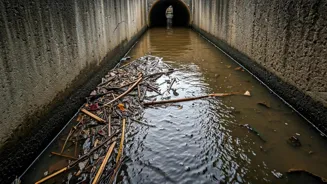Unused Funds, Rising Waters
Delhi experienced another wave of flooding, underscoring critical issues in its infrastructure. While many areas suffered under the deluge, the city's
failure to utilize a significant budget for drain repairs surfaced as a key concern. A staggering Rs 150 crore had been sanctioned for enhancing the drainage system, yet the funds were not put to use until the end of August 31. This lapse in execution directly contributed to the inundation. This underscores that effective planning and timely implementation of projects are crucial for a city like Delhi to manage heavy rainfall and prevent the kind of problems that unfolded.
Failed Repair Initiatives
The lack of activity surrounding the drain repair funds points to possible mismanagement or other administrative snags. Infrastructure projects typically entail a complex process, but leaving such a considerable amount unspent until the end of August is unusual. Several factors could have contributed to this, including project delays, bureaucratic hurdles, or perhaps even challenges in allocating resources effectively. Whether it be project delays, bureaucratic hurdles or allocation of resources effectively, these issues would have a significant impact on the city's ability to handle heavy rain. It is important to look into the causes for the unspent funds to ensure accountability and also implement steps so that such situations do not happen again.
Impact of Flooding
The recurring flooding in Delhi has had serious consequences for the city's residents and infrastructure. The waterlogging has disrupted daily life, causing traffic congestion and damaging property. Moreover, it poses health risks due to the spread of waterborne diseases. The situation also strains the city's resources as emergency services are mobilized to provide aid and mitigate the effects of the flooding. Addressing this requires a combined approach, from enhanced infrastructure to effective disaster management strategies. It highlights the importance of timely actions to minimize the damage and impact of such incidents.
Looking Ahead, Solutions
To avoid future occurrences of flooding, the city requires comprehensive measures. Firstly, accelerating the implementation of the drain repair projects is critical. Funds must be utilized promptly and transparently to enhance the drainage capacity. In addition, it is necessary to improve urban planning to accommodate increased rainfall. This includes better waste management, and measures to prevent blockage of drainage channels. Moreover, residents should get better awareness about civic responsibility and disaster preparedness. Furthermore, regular maintenance, combined with the use of new technologies, can go a long way. With the right approach, the city can enhance its ability to cope with extreme weather and secure a better quality of life for its inhabitants.













